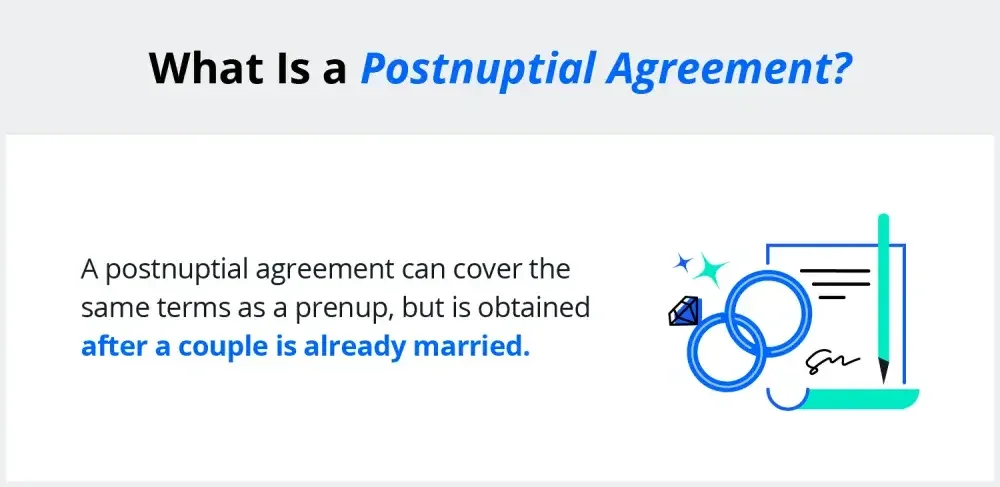Imagine this: You’ve recently gotten married to the love of your life. You’re still basking in the post-wedding glow when your grandmother dies. She leaves you with a significant inheritance, a life-changing amount of money.
That money now not only belongs to you but to your spouse as well. If you were to get divorced, that would be considered marital property and would be divided based on your state’s laws between the two separating spouses. You didn’t sign a prenup before marriage, but now you’re wondering if you should have.

Can you get a prenup after marriage?
The short answer: no. A prenuptial agreement, as the name implies, is only for before your nuptial services or wedding. Once the marriage license has been signed, you’re no longer eligible for a prenuptial agreement.
But you can enter into a postnuptial agreement. A postnuptial agreement, also known as a postnup, post-marital agreement, or postnuptial contract, is structurally and legally very similar to a prenup. It allows spouses to agree to the division of shared and separate property and assets in the case of divorce.
What are postnuptial agreements?
A postnuptial agreement is essentially a prenuptial agreement that’s signed after marriage. A postnup will cover the division of assets, property, and debts in the event of death or divorce. To be valid, a postnuptial agreement must be in writing, be entered into willingly by both parties, be signed by both parties, and both parties must make an honest and full financial disclosure.
Postnuptial agreements are different from separation agreements in that the spouses sign without the intent to separate. A separation agreement is only created once spouses have decided to get divorced. It’s precautionary, setting up the spouses to save time and money on divorce proceedings if they decide later on to separate.

A postnup can cover:
- Inheritance issues
- Separation of debts
- Division of marital and individual property
- Business ownership rights
- Expectations of spouses of one another
- Financial responsibilities of each spouse
- Potential, future alimony
One of the biggest benefits of a postnuptial agreement is that it can determine the terms of separation prior to divorce. By signing a postnuptial agreement and defining the terms of divorce in advance, both parties will have a simpler, less costly, and drawn-out divorce process.
Prenuptial agreements vs. postnuptial agreements: What’s the difference?
There are two main differences between prenuptial agreements and postnups: timing and the reason for signing.
- Timing: The most basic difference between these two legal agreements is that a prenup is signed before marriage, while a postnup is signed after marriage.
- Reasons for signing: In general, a prenuptial agreement outlines the terms and conditions for the division of assets in case of separation. A postnup can outline the same material, but it can also be used to update an existing prenup and address any changes that have happened since the wedding.
While different, prenuptial agreements and postnups function very similarly. They are both legally enforceable documents that denote how shared and individual assets will be divided in the event of a divorce. The agreement can lay out provisions for both marital assets and individual property.
Reasons to consider a postnup
While signing contracts isn’t high up on most people’s list of romantic gestures, at its core, a marriage is a legal contract. Adding either a prenuptial agreement or postnuptial agreement (or both!) can give both you and your spouse peace of mind that the other will be secure and taken care of in the case of separation, divorce, or death.
A postnup, which is created and signed after marriage, can address a number of large life changes.
For example, you may want to create a postnup if one partner has had significant changes in financial status if a business is owned or acquired, if a partner has had major career changes, or has taken on debt.
Separating business interests
During the divorce court process, all assets must be valued to ensure the shared property is being split equally. This includes a business, even if that business is owned by only one spouse.
A postnuptial agreement can lay out how the spouses agree to value and split the value of a business. One spouse may keep the business while the other gets a higher portion of non-business assets as compensation.
Change in financial status: inheritance or gift
If one spouse expects or receives a large financial gift or inheritance, a postnuptial agreement can define how that money would be divided in the case of separation.
This most often happens when one spouse may inherit significant assets. In many states, any assets acquired during marriage are considered marital property. In these community property states, the assets would be split equally between the spouses in the event of separation.
While an inheritance isn’t always considered marital property, if it’s used as community property during the marriage, it may be considered co-mingled and become marital property. Any increase in the value of the inheritance during the marriage also would be considered shared. A postnuptial agreement can outline how both spouses want that money to be handled in the event of a divorce.
Another common large financial gain is a gift from one spouse's parents. Whether that’s for a down payment or other large purchases, the gift may be expected to be repaid. The postnuptial agreement can lay out the expectations of that repayment if the relationship doesn’t last.
Providing for a stay-at-home parent
A postnuptial agreement can also dictate the separation of assets for a stay-at-home parent.
If one parent has chosen to stay at home to raise children, that parent may foresee a struggle to reenter the workforce. This can be accounted for in a postnuptial agreement.
While that parent may have less earning potential in the future, the postnuptial agreement can set out provisions to offer them additional protections in the event of divorce.
Separating debt
If one spouse goes back to school or starts a business and takes on a significant amount of debt, a postnuptial agreement can protect the other spouse from taking on that debt in the event of separation or divorce.
Legal considerations and requirements for postnups
Similarly to prenups, postnuptial agreements must follow a few legal requirements. In order to be enforceable, postnuptial agreements must be in writing, include a full financial disclosure from each spouse, be entered into willingly, and can’t be overly one-sided.
While it’s not necessary to work with an attorney to create your postnup, a DIY approach can increase the chances that your contract won’t meet all of the legal requirements. If this approach feels too risky for you and your partner, you can work with one of LegalZoom’s family attorneys to get started.
Must be in writing and signed
To be considered a legal contract, postnuptial agreements must be in writing and signed by both parties. Postnups follow basic contract law in most states. If these two requirements are not met, it may not be enforceable or may be incredibly difficult to enforce in court.
To lend a little more authority to your document, you can sign your postnup in front of a notary public. This can add a layer of protection if the document is challenged in court. Notarization isn’t required, but it can be helpful.
Full financial disclosure from both spouses
One of the very important stipulations that must be followed in a postnup is a full financial disclosure from both spouses.
The reasoning behind this is that to willingly enter into a contract, you must first have a full understanding of your spouse’s financial assets and debts. If your spouse is hiding something or doesn’t share about debts or assets, you’re not getting a full or clear picture of their financial circumstances. Without full disclosure, you cannot enter into the contract knowingly.
If it is discovered that one spouse has hidden parts of their finances from the other spouse, the postnuptial agreement may be considered void and unenforceable.
Entered into willingly and knowledgeably
Another critical aspect of agreeing to a postnuptial agreement is that it’s entered into willingly. One spouse cannot coerce the other into signing the agreement.
It can be beneficial, though not a requirement, for each spouse to seek independent legal counsel to review the agreement prior to signing. This ensures that the agreement is fair to each party and that it isn’t one-sided or benefiting one spouse over the other.
While signing a contract may not seem like the most romantic gesture you can share with your partner, doing the thinking and planning for your financial futures when everyone is calm and feeling positive about the other person, can save you a lot of heartache, time, and money in the future if a divorce becomes necessary.
FAQs
Can you sign a prenuptial agreement after marriage?
No. While you can’t sign a prenuptial agreement after marriage, you can sign a postnup, which is legally and structurally very similar.
Is a postnuptial agreement a good idea?
A postnuptial agreement may initially sound unromantic, but it can provide you and your spouse with a lot of protection. It can lay out each spouse's financial obligations in the event of divorce or death. If you're still not sure, consider consulting a postnuptial agreement lawyer.
What can postnuptial agreements not cover?
Similar to what a prenuptial agreement can't cover, there are a few specific instances that a postnup cannot cover, such as:
- Child custody or child support: Both child custody and child support are regulated by a different set of laws. Child custody provisions, even for children from a previous marriage, cannot be included in a postnup.
- Encouraging divorce or separation
- Promoting illegal or unconscionable activities
One place where a postnup differs from a prenuptial agreement is that it cannot waive the right to alimony or spousal support.

